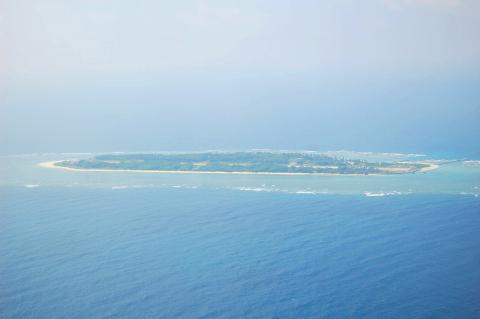Taiwan will launch oil exploration efforts in waters off Itu Aba Island (Taiping Island, 太平島) next year, in a move that is likely to raise tensions with other claimants to a series of islets in the South China Sea.
During a meeting at the legislature in Taipei yesterday, Bureau of Energy officials confirmed that the Ministry of Economic Affairs’ Bureau of Mines, in cooperation with CPC Corp, Taiwan (CPC, 台灣中油), would send ships to waters near Itu Aba to conduct exploration for potential oil resources next year.
Bureau of Energy Director-General Jerry Ou (歐嘉瑞) told the Foreign Affairs and National Defense Committee that a monthly budget of NT$17 million (US$583,670) would be allocated to fund the efforts.

Photo: CNA
Ou said that as Taiwan is almost entirely dependent on imports for its oil supply, it was imperative for the nation to diversify its energy sources.
Though unproven, the South China Sea is believed to contain important oil and gas resources. Taiwan, China, Vietnam, the Philippines, Malaysia and Brunei all lay claim to parts of the area.
Administered by Taiwan, Itu Aba is the largest islet in the disputed Spratly Islands (Nansha Islands, 南沙群島). It lies about 1,400km from Greater Kaohsiung.
In 2008, Taiwan finished constrcution of a 1,150m airstrip on the island. Earlier this year, the Coast Guard Administration — which is mandated with defending sovereignty over the island — augmented its equipment on Itu Aba with a supply of T63 120mm mortar systems and L/60 40mm anti-aircraft guns, sparking protests among other claimants, including Vietnam and the Philippines.
Asking for a progress report, Chinese Nationalist Party (KMT) Legislator Lin Yu-fang (林郁方), a strong supporter of Taiwan playing a more muscular role in the area, was assured that the plan had advanced past the “paperwork phase” and would be initiated as early as next month.
It has yet to be confirmed whether the exploration boats will be accompanied by coast guard vessels.
KMT Legislator Chen Cheng-hsiang (陳鎮湘) said the government should actively mine the waters near the Spratlys and the Pratas Islands (Dongsha Islands, 東沙群島) and establish a forward base in the area to oversee energy, fishing and environmental protection.
He also said a multilateral center should be established to lower the risks of sovereignty disputes with other countries.
On March 22, two coast guard speedboats were dispatched to intercept a pair of Vietnamese patrol vessels that had entered waters near Taiping, prompting the Ministry of Foreign Affairs to file a protest with Hanoi.
Two other ships entered waters near the island on March 26. The coast guard subsequently denied reports that shots had been fired during the incident.

MAKING WAVES: China’s maritime militia could become a nontraditional threat in war, clogging up shipping lanes to prevent US or Japanese intervention, a report said About 1,900 Chinese ships flying flags of convenience and fishing vessels that participated in China’s military exercises around Taiwan last month and in January last year have been listed for monitoring, Coast Guard Administration (CGA) Deputy Director-General Hsieh Ching-chin (謝慶欽) said yesterday. Following amendments to the Commercial Port Act (商港法) and the Law of Ships (船舶法) last month, the CGA can designate possible berthing areas or deny ports of call for vessels suspected of loitering around areas where undersea cables can be accessed, Oceans Affairs Council Minister Kuan Bi-ling (管碧玲) said. The list of suspected ships, originally 300, had risen to about

DAREDEVIL: Honnold said it had always been a dream of his to climb Taipei 101, while a Netflix producer said the skyscraper was ‘a real icon of this country’ US climber Alex Honnold yesterday took on Taiwan’s tallest building, becoming the first person to scale Taipei 101 without a rope, harness or safety net. Hundreds of spectators gathered at the base of the 101-story skyscraper to watch Honnold, 40, embark on his daredevil feat, which was also broadcast live on Netflix. Dressed in a red T-shirt and yellow custom-made climbing shoes, Honnold swiftly moved up the southeast face of the glass and steel building. At one point, he stepped onto a platform midway up to wave down at fans and onlookers who were taking photos. People watching from inside

Japan’s strategic alliance with the US would collapse if Tokyo were to turn away from a conflict in Taiwan, Japanese Prime Minister Sanae Takaichi said yesterday, but distanced herself from previous comments that suggested a possible military response in such an event. Takaichi expressed her latest views on a nationally broadcast TV program late on Monday, where an opposition party leader criticized her for igniting tensions with China with the earlier remarks. Ties between Japan and China have sunk to the worst level in years after Takaichi said in November that a hypothetical Chinese attack on Taiwan could bring about a Japanese

STREAMLINED: The dedicated funding would allow the US to transfer equipment to Taiwan when needed and order upgraded replacements for stockpiles, a source said The US House of Representatives on Thursday passed a defense appropriations bill totaling US$838.7 billion, of which US$1 billion is to be allocated to reinforcing security cooperation with Taiwan and US$150 million to replace defense articles provided to the nation. These are part of the Consolidated Appropriation Act, which the US House yesterday passed with 341 votes in favor and 88 against. The act must be passed by the US Senate before Friday next week to avoid another government shutdown. The US House Committee on Appropriations on Monday unveiled the act, saying that it allocates US$1 billion for the Taiwan Security Cooperation Initiative